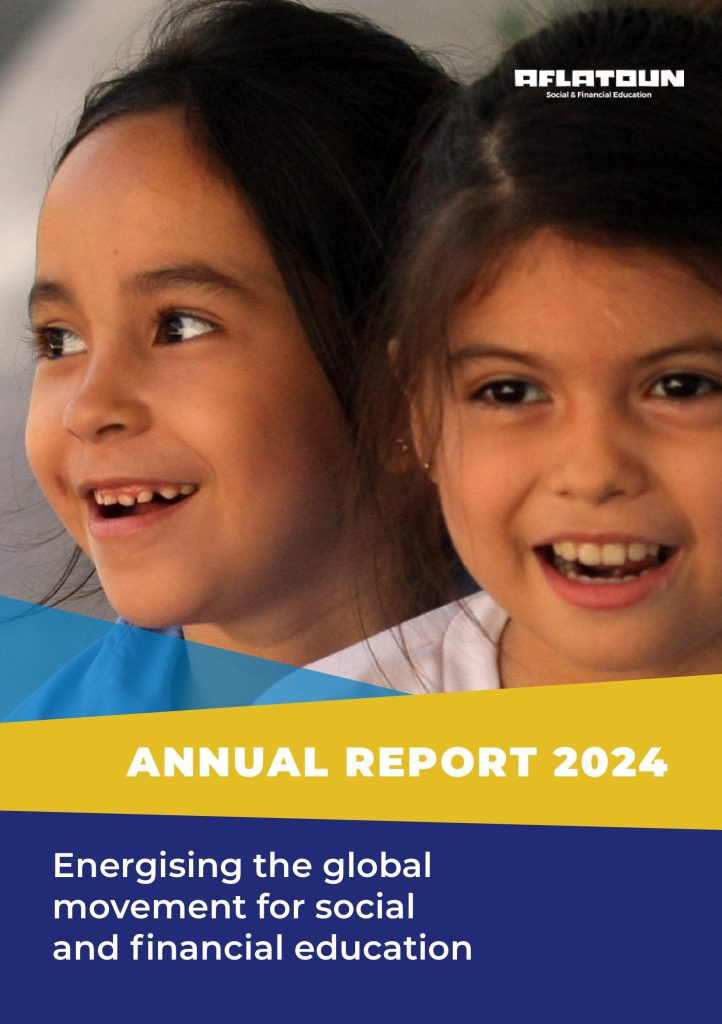A comprehensive look at Aflatoun International’s groundbreaking Financial Education for Parents initiative in partnership with The Human Safety Net.
In the bustling anganwadi (childcare center) of Ratalya village in Rajasthan, India, a quiet revolution is taking place. Kavita, a 25-year-old mother of four-year-old Meena, sits with her colorful expense-tracker journal – a simple yet powerful tool that has transformed how she thinks about money, savings, and her daughter’s future.
“This diary is something I have taken to after attending the sessions at the anganwadi,” Kavita explains, pointing to the neat columns recording dates, incomes, expenses, and savings. “Now I pay attention to the expenses and do not fulfill all my child’s ‘wants.’ We buy things based on ‘needs.’ My child is also learning by watching us.“
Kavita’s story is just one of thousands emerging from Aflatoun International’s ambitious Financial Education for Parents initiative – a project that has reached 2,314 parents across six countries, fundamentally changing how families approach financial decision-making and plan for their children’s futures.
A Global Challenge, A Targeted Solution
The need for financial literacy among parents has never been more urgent. In an increasingly complex economic landscape, parents struggle with budgeting, saving, and making informed financial decisions that impact their children’s well-being and future opportunities.
Recognising this critical gap, Aflatoun International partnered with The Human Safety Net to develop and implement a comprehensive financial education programme across India, Germany, Italy, Poland, Spain, and France.
The initiative targeted economically vulnerable families – those with limited access to financial education, unstable income sources, and a lack of structured financial planning.
Through carefully designed modules, interactive training sessions, and partnerships with 16 local NGOs, the programme addressed fundamental financial concepts while respecting cultural contexts and local realities.
From Needs to Action: A Methodical Approach
The project began with comprehensive needs assessments in each country, revealing common challenges: limited access to banking services, irregular income streams, and difficulty planning long-term financial goals. These insights shaped the development of a culturally adapted curriculum that condensed complex financial concepts into accessible, engaging sessions.
The transformation of the original ten-session module into three to four focused sessions proved crucial. As project coordinators discovered, parents juggling multiple responsibilities needed concentrated, impactful learning experiences rather than extended programmes that competed with their daily survival needs.
Training the Trainers: Building Local Capacity
Central to the programme’s success was the comprehensive Training of Trainers (ToT) approach. A total of 394 professionals were trained across the six countries, equipped with active learning methodologies, gender-sensitive approaches, and practical tools for delivering financial education.
In Milan, Italy, 24 NGO facilitators engaged enthusiastically with interactive learning methods. In Madrid, Spain, ten experienced educators working with vulnerable communities gained tools to address sensitive topics like gender and financial inclusion.
From Mumbai to Warsaw, trainers learned to adapt content to local contexts while maintaining core educational objectives.
The training incorporated diverse instructional techniques, including role-playing, group discussions, “vote with your feet” activities, and “running dictation” – methods that made financial concepts accessible to parents with varying literacy levels.
Real Impact, Measurable Change
The programme’s effectiveness is reflected in compelling statistics and personal transformations.
Pre- and post-survey results demonstrate significant improvements across multiple countries:
Savings Behavior Transformation:
- India: 41% increase in participants with savings
- Italy: 24% increase in participants with savings
- Spain: 18% increase in participants with savings
Behavioral Changes:
- Italy: 11% reduction in participants who frequently borrow money for expenses
- Spain: 20% reduction in participants experiencing issues covering family needs
- India: 33% reduction in participants applying for loans for daily expenses
Beyond numbers, the programme builds up intergenerational financial knowledge transfer. Parents began involving children in their financial decisions, teaching them to distinguish between “wants” and “needs,” and modelling responsible financial behaviour.
Cultural Adaptation: Learning from Local Contexts
Each country presented unique challenges and opportunities.
In France, cultural hesitation around discussing money required innovative approaches like role-playing exercises that allowed parents to engage with financial topics “in someone else’s shoes.”
In Germany, the programme addressed integration challenges for refugee families by providing financial education in accessible formats.
The Rajasthan case study reveals how historical context shapes financial behaviour. In a region where the collapse of the Jaswant Sagar Dam in the 1980s forced families to seek formal banking for the first time, the programme built upon existing cultural values of thrift and community support while introducing modern financial tools.
Kanna Ram, a 58-year-old daily wage earner from Ratalya, exemplifies this blend of traditional wisdom and new learning: “We have never been to a seth-sahukaar (money lender). It’s better to cut costs than mortgage your land.” The programme helped families like his formalise their savings practices and plan more systematically for their children’s futures.
Overcoming Challenges: Innovation in Action
The programme encountered significant obstacles that required creative solutions:
Language and Literacy Barriers: Facilitators developed storytelling techniques, visual aids, and culturally relevant examples to make financial concepts accessible to parents with limited formal education.
Time Constraints: Recognising that parents struggled to attend multiple sessions, some locations consolidated the programme into two three-hour sessions instead of three two-hour sessions, resulting in significantly improved attendance.
Cultural Sensitivity: In communities where discussing money was taboo, facilitators used indirect approaches and peer learning to gradually build comfort with financial conversations.
Awareness Building: To address limited understanding of financial literacy’s importance, the programme developed parent ambassador programmes where successful participants encouraged others to join.
Building for the Future: Sustainability and Scale
The programme’s sustainability strategy centers on two key pillars: volunteer integration and peer-to-peer learning.
Through The Human Safety Net Academy, volunteers receive comprehensive training to support NGOs in delivering sessions, creating a sustainable model for programme expansion.
The results speak to the programme’s potential for lasting impact: 95% of participating NGOs confirmed that the programme significantly enhanced financial awareness among parents, with 59% planning to expand their reach in 2025 and beyond.
Lessons for Global Development
The Financial Education for Parents initiative offers valuable insights for development practitioners worldwide:
- Context Matters: Successful financial education must be deeply rooted in local cultural, economic, and social realities.
- Simplicity is Powerful: Complex financial concepts can be distilled into accessible, actionable knowledge without losing their effectiveness.
- Intergenerational Impact: Educating parents creates ripple effects that benefit entire families and communities.
- Community Partnerships: Local NGOs and community organisations are essential partners for sustainable program delivery.
- Flexibility Enhances Access: Adapting programme format to participants’ constraints improves engagement and outcomes.
A Vision Realised
As Kavita in Ratalya village continues tracking her family’s expenses and saving for her daughter’s English education, and as thousands of other parents across six countries apply their newfound financial knowledge, the broader vision of Aflatoun International comes into focus: a world where every young person has access to quality social and financial education.
The Financial Education for Parents initiative demonstrates that with thoughtful design, cultural sensitivity, and committed partnerships, financial literacy programmes can break cycles of poverty and create foundations for intergenerational prosperity.
From the anganwadis of Rajasthan to the community centers of Milan, parents are not just learning about money – they’re investing in their children’s futures and building more resilient communities.
The journey continues, with lessons learned informing future initiatives and proven methodologies ready for adaptation in new contexts.
As one mother in Jodhpur reflected, “My child is also learning by watching us” – a reminder that the most powerful education often happens not in classrooms, but in the daily choices parents make when armed with knowledge, confidence, and hope.












